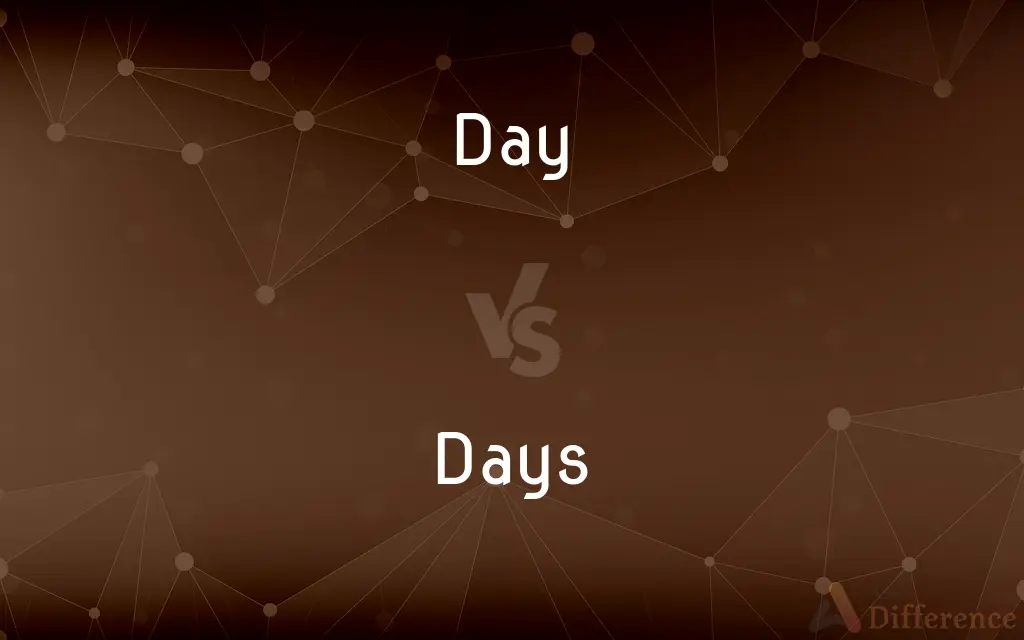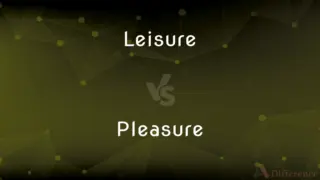Day vs. Days — What's the Difference?
Edited by Tayyaba Rehman — By Urooj Arif — Updated on April 24, 2024
"Day" refers to a single 24-hour period or the daylight part of it, while "days" is the plural form, indicating multiple such periods.

Difference Between Day and Days
Table of Contents
ADVERTISEMENT
Key Differences
"Day" is used to denote one specific 24-hour cycle or the time between sunrise and sunset, which varies throughout the year. For example, a day can be referred to as Monday. On the other hand, "days" refers to more than one such period, used when talking about events or experiences over time, such as in a week or a month.
In grammar, "day" functions as a singular noun, requiring singular verb forms and pronouns. For instance, "The day is warm." Conversely, "days" as a plural noun, pairs with plural verbs and pronouns, as in "The days are getting longer."
When specifying a particular day, the singular form is crucial, pointing to a unique date or day of the week. It emphasizes a singular event or appointment. Whereas "days" generalizes over a series of dates, useful for discussing trends or recurring events.
The term "day" often carries symbolic or metaphorical meanings, representing concepts like new beginnings or opportunities — each day is a fresh start. In contrast, "days" can imply a passage of time or a period with a particular characteristic, such as "the days of youth."
In expressions, "day" and "days" serve different rhetorical purposes. "Day" can highlight immediacy or singularity in phrases like "day by day," while "days" often appears in reflective contexts, as in "those were the days."
ADVERTISEMENT
Comparison Chart
Number
Singular
Plural
Usage
Refers to one specific period.
Refers to multiple periods.
Grammatical Role
Takes singular verbs and pronouns.
Takes plural verbs and pronouns.
Symbolism
Often signifies a fresh start or new opportunity.
Suggests a span or era, emphasizing continuity or change.
Common Phrases
"Day by day", "at the end of the day"
"these days", "in the old days"
Compare with Definitions
Day
The time from sunrise to sunset.
We spent the day at the beach.
Days
Used to describe longer periods or sequences.
The days are getting colder as winter approaches.
Day
A period of 24 hours.
A day consists of morning, afternoon, and night.
Days
Used in expressions of duration or futurity.
The repair might take a few days.
Day
Used to indicate a particular point in time.
The project is due in a day.
Days
Reflects on past times or eras.
In my grandparents' days, things were quite different.
Day
A specific day of the week or date.
The meeting is scheduled for Tuesday, the third day of the week.
Days
The plural of day, indicating more than one day.
The festival lasts for three days.
Day
Symbolic of a new opportunity or challenge.
Each day offers a chance to start anew.
Days
Indicates habitual actions or conditions over time.
These days, it's hard to find time for relaxation.
Day
A day is approximately the period during which the Earth completes one rotation around its axis, which takes around 24 hours. A solar day is the length of time which elapses between the Sun reaching its highest point in the sky two consecutive times.
Days
During the daytime on every day or most days
She works days and sings in a band at night.
Day
The period of light between dawn and nightfall; the interval from sunrise to sunset.
Days
Plural of day
Day
The 24-hour period during which the earth completes one rotation on its axis, traditionally measured from midnight to midnight.
Days
A particular time or period of vague extent.
Things were more relaxed in Grandpa's days.
Day
The period during which a celestial body makes a similar rotation.
Days
Life.
That's how he ended his days.
Day
One of the numbered 24-hour periods into which a week, month, or year is divided.
Days
During the day.
She works days at the garage.
Day
The portion of a 24-hour period that is devoted to work, school, or business
An eight-hour day.
A sale that lasted for three days.
Days
The time during which someone's life continues;
The monarch's last days
In his final years
Day
A 24-hour period or a portion of it that is reserved for a certain activity
A day of rest.
Day
A specific, characteristic period in one's lifetime
In Grandmother's day, skirts were long.
Day
A period of opportunity or prominence
Every defendant is entitled to a day in court. That child will have her day.
Day
A period of time in history; an era
We studied the tactics used in Napoleon's day. The day of computer science is well upon us.
Day
Days Period of life or activity
The sick cat's days will soon be over.
Day
Of or relating to the day.
Day
Working during the day
The day nurse.
Day
Occurring before nightfall
A day hike.
Day
Any period of 24 hours.
I've been here for two days and a bit.
Day
A 24-hour period beginning at 6am or sunrise.
Your 8am forecast: The high for the day will be 30 and the low, before dawn, will be 10.
Day
A period from midnight to the following midnight.
The day begins at midnight.
Day
(astronomy) Rotational period of a planet (especially Earth).
A day on Mars is slightly over 24 hours.
Day
The part of a day period which one spends at one’s job, school, etc.
I worked two days last week.
Day
Part of a day period between sunrise and sunset where one enjoys daylight; daytime.
Day and night;
I work at night and sleep during the day.
Day
A specified time or period; time, considered with reference to the existence or prominence of a person or thing; age; time; era#Noun.
Every dog has its day;
In that day;
Back in the day;
In those days
Day
A period of contention of a day or less.
The day belonged to the Allies.
Day
(Judaism) A time period from a nightfall until the following nightfall
Day
To spend a day (in a place).
Day
The time of light, or interval between one night and the next; the time between sunrise and sunset, or from dawn to darkness; hence, the light; sunshine; - also called daytime.
Day
The period of the earth's revolution on its axis. - ordinarily divided into twenty-four hours. It is measured by the interval between two successive transits of a celestial body over the same meridian, and takes a specific name from that of the body. Thus, if this is the sun, the day (the interval between two successive transits of the sun's center over the same meridian) is called a solar day; if it is a star, a sidereal day; if it is the moon, a lunar day. See Civil day, Sidereal day, below.
Day
Those hours, or the daily recurring period, allotted by usage or law for work.
Day
A specified time or period; time, considered with reference to the existence or prominence of a person or thing; age; time.
A man who was great among the Hellenes of his day.
If my debtors do not keep their day, . . . I must with patience all the terms attend.
Day
Preceded by the) Some day in particular, as some day of contest, some anniversary, etc.
The field of Agincourt,Fought on the day of Crispin Crispianus.
His name struck fear, his conduct won the day.
Day
Time for Earth to make a complete rotation on its axis;
Two days later they left
They put on two performances every day
There are 30,000 passengers per day
Day
Some point or period in time;
It should arrive any day now
After that day she never trusted him again
Those were the days
These days it is not unusual
Day
The time after sunrise and before sunset while it is light outside;
The dawn turned night into day
It is easier to make the repairs in the daytime
Day
A day assigned to a particular purpose or observance;
Mother's Day
Day
The recurring hours when you are not sleeping (especially those when you are working);
My day began early this morning
It was a busy day on the stock exchange
She called it a day and went to bed
Day
An era of existence or influence;
In the day of the dinosaurs
In the days of the Roman Empire
In the days of sailing ships
He was a successful pianist in his day
Day
A period of opportunity;
He deserves his day in court
Every dog has his day
Day
The period of time taken by a particular planet (e.g. Mars) to make a complete rotation on its axis;
How long is a day on Jupiter?
Day
The time for one complete rotation of the earth relative to a particular star, about 4 minutes shorter than a mean solar day
Day
United States writer best known for his autobiographical works (1874-1935)
Common Curiosities
Can "day" and "days" be used interchangeably?
No, "day" is singular and "days" is plural; they serve different grammatical and contextual purposes.
What scenarios are most appropriate for using "days"?
"Days" is best used when discussing events or experiences that span multiple days.
Are there any proverbs or idioms that use "days"?
Yes, such as "in the old days" or "these are the days."
Can "day" symbolize anything other than time?
Yes, "day" often symbolizes new beginnings, opportunities, or challenges.
How does the use of "day" affect sentence construction?
When using "day," verbs and pronouns must be in the singular form to match the noun.
Why might someone choose to use "day" over "days" in writing?
Using "day" focuses on a single, specific period, which can emphasize immediacy or significance.
What role do "day" and "days" play in time management?
They are crucial for planning and organizing activities over time.
Is it grammatically correct to say "day's" in any context?
"Day's" is a possessive form, used correctly in contexts like "a day's work."
How does literary use of "day" and "days" differ?
Literature may use "day" to focus on a pivotal moment, while "days" might evoke a nostalgic or historical period.
What expressions commonly involve "day"?
Phrases like "day by day" or "at the end of the day" are common.
What are some challenges in translating "day" and "days"?
Translating these terms can be tricky, as the concept of what constitutes a day may vary culturally.
What is the difference between "day" and "days"?
"Day" refers to a single 24-hour period or the daylight hours, while "days" indicates multiple such periods.
How do different cultures interpret the concept of a "day"?
Interpretations can vary, but generally, a "day" is universally recognized as a 24-hour cycle.
Can "days" ever refer to a non-specific amount of time?
Yes, "days" can be used vaguely to suggest an indefinite but extended period.
What are some common mistakes when using "day" and "days"?
Common mistakes include mismatching the number with verbs or using them incorrectly in phrases.
Share Your Discovery

Previous Comparison
Leisure vs. Pleasure
Next Comparison
Whirl vs. TwirlAuthor Spotlight
Written by
Urooj ArifUrooj is a skilled content writer at Ask Difference, known for her exceptional ability to simplify complex topics into engaging and informative content. With a passion for research and a flair for clear, concise writing, she consistently delivers articles that resonate with our diverse audience.
Edited by
Tayyaba RehmanTayyaba Rehman is a distinguished writer, currently serving as a primary contributor to askdifference.com. As a researcher in semantics and etymology, Tayyaba's passion for the complexity of languages and their distinctions has found a perfect home on the platform. Tayyaba delves into the intricacies of language, distinguishing between commonly confused words and phrases, thereby providing clarity for readers worldwide.
















































